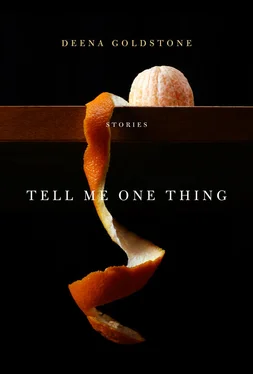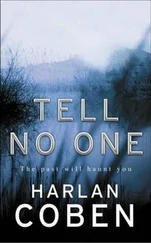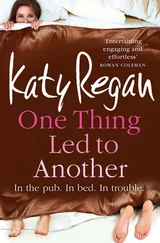But when did they ever have satisfactory conversations? Maybe when Carter was three or four and Trudy began to introduce him to the children’s books she had always loved. He loved them, too, and would ask her to read them to him over and over, and that bond lasted until he started first grade and began a life apart from her — friends, sports, the technology that boys seem to inhale into their pores. Every year after that, the distance between them grew wider and wider until finally, when Carter was able to make a choice of his own, he insisted on moving all the way across the country to attend Franklin Pierce University in Rindge, New Hampshire. Ridiculous place to go to school , Trudy has often thought but never said outright to anyone but Brian. “Freezing, in the middle of nowhere,” Trudy would complain to Brian. “Yes, but so far away,” Brian would say because he understood what Trudy didn’t — that Carter was never comfortable with them.
She gets off the phone with him every Sunday afternoon dissatisfied and cranky. And misses Brian even more. Gentle, patient Brian would listen to her rants, shake his head at whatever unfairness she was railing against, and get on with whatever he had been doing, usually gardening, before Trudy had sought him out and unloaded her latest diatribe. The listening and the moving on — both brought Trudy comfort.
Now she has no avenue but action to displace her anger, and so she finds herself, petition in hand, ringing her neighbors’ doorbells. The fact that she knows none of them, not a one, despite her thirty-plus years on the block doesn’t seem unusual to Trudy. She’s never been the sort of woman who stands and chitchats at the curb or makes small talk when out walking the dog. They’ve never owned a dog. In truth, Trudy didn’t feel the need to know her neighbors while Brian was alive. He was the one who would say hello as he gardened out front. He knew them by sight. He waved as they drove by. That was sufficient.
So now Trudy has to introduce herself to her neighbors. At the first house, the woman who answers the door of the small Craftsman, way down at the end of the block, quickly signs the petition. She’s young, maybe thirty, and has the distracted look of a mother of too many young children. Trudy can see at least three running around the living room, carrying on, as the woman, Susannah, as Trudy can see from her signature, tells Trudy how important the park is to them.
“Well, I can’t imagine not having the park.”
Trudy nods. She feels the same way. Good, a supporter.
“Where would the kids play?” and then she shrugs self-consciously and turns her shoulder to indicate the activity behind her. “And how much of that in the house could any one person take?”
As she hands the petition back to Trudy, she says, “You’re so good to do this,” and a fair-haired little girl of maybe four slips in beside her mother, holding on to one of her legs.
“You’re the Story Lady,” the child says, a thumb going into her mouth.
“You’re right. Good remembering. And I remember you from when I read If You Give a Mouse a Cookie .…”
The child nods, pleased, and the mother takes the opportunity to say, “We’re so sorry about your husband” and what has been a fine interaction, a moment that feels almost normal, suddenly stabs Trudy in the heart. She doesn’t want to, she can’t, share her grief with strangers, however well meaning. That’s the only trouble with living in Sierra Villa , Trudy thinks as she says good-bye and moves on to the next house, everyone knows your business .
To her relief, the rest of the block goes smoothly and everyone on her side of the street signs. Trudy is fierce in her advocacy and people quickly agree that they must keep the park, that condos on that land would be horrible. To Trudy’s great relief, no one else mentions Brian. And then, there’s only one house left — the Yeller’s, at the corner. Trudy could skip his house and head to the opposite side of the street. She’s tempted to, but she won’t allow herself this weakness. She knocks on what she will always consider Vivianna’s door and a little boy of maybe six opens it for her. He’s blond and solemn, the sort of child whose features seem to have migrated to the middle of his face, leaving lots of cheek and forehead.
“Is your mother home?” Trudy asks him. Far better to speak with the mother than the rodent father. Not that she’s ever exchanged a word with the woman, but she seems more reasonable than the screamer. Trudy hears her speak nicely to the two boys.
But the child shakes his head no to her question; his mother isn’t at home. And then she hears the voice from somewhere inside the house, that ugly voice which disrupts the daily quiet of her house. “Never open the door! WHO DO YOU THINK YOU ARE?!” And Trudy sees the little boy flinch and then his father is there. “Get away from here,” he tells his son, who flees back into the house. And it is only Trudy and this man, this Kevin person, facing each other across the threshold. It’s the first time she’s ever been face-to-face with him and she’s surprised at how tall he is. Tall and white skinned and just as menacing as his words.
Trudy chooses to ignore the interaction she just witnessed — the ugliness of it, the evident fear the child has of his father’s anger — and presents the petition. “The city council is contemplating selling the library park to developers,” she begins. He says nothing. “If we get enough signatures on this petition, we may be able to save the park.”
She holds the clipboard with the petition out to him, but he doesn’t take it. Instead he says, “I don’t sign anything. You never know where your signature ends up.”
Trudy can feel anger rising in her like a flush, but she attempts civility. “I can guarantee you it will end up at the city council meeting on the first Tuesday of next month.”
“And then where? Can you guarantee me that it won’t go any further?”
Trudy is nonplussed. She has no idea what he means. But it’s immediately clear to her that he lives as if under siege. “Do you want to save the park or not? You have kids, don’t you want them to have a place to play?”
“My kids play in the backyard.”
“So you don’t care what happens to the park?”
“You got it, lady.”
“How civic-minded of you.” Trudy can’t help it. Her allotment of civility has been used up and he’s not stupid, although she wishes he were, and he immediately gets the sarcasm.
“Get off my property. Do-gooders like you just gum up the system.” And he closes the door in her face. It feels like a slap.
She crosses his driveway to hers — no fence in between, no line of shrubbery. Dammit! They never needed any demarcation when Vivianna was there, and now she regrets the open space with every particle of her being.
In the kitchen she gets herself a glass of water, furious and agitated, shaken really, but she refuses to call it that. That man makes her so angry she could spit! She glares out her kitchen window directly into his, across their two driveways. When Vivianna was alive Trudy never minded the proximity. It was a way to keep tabs on the older woman, making sure she was moving about and everything seemed all right. Now, with the Yeller next door, it feels like the privacy of her kitchen is being violated every single day. Curtains, those frilly things Trudy has always hated, she needs to get curtains! And then she argues with herself, No, I will not give him the satisfaction!
The petition lies on the kitchen table and the first page isn’t even completely filled. Trudy knows she has to go back out there. There’s the whole other side of the street. Seven more doorbells to ring. Oh, how she’d love to just stop. Forget it. But then there’s the park. And the principle of the thing. And the fact that she’s not a quitter. And the fact that she has nothing else to do on this Sunday afternoon.
Читать дальше












